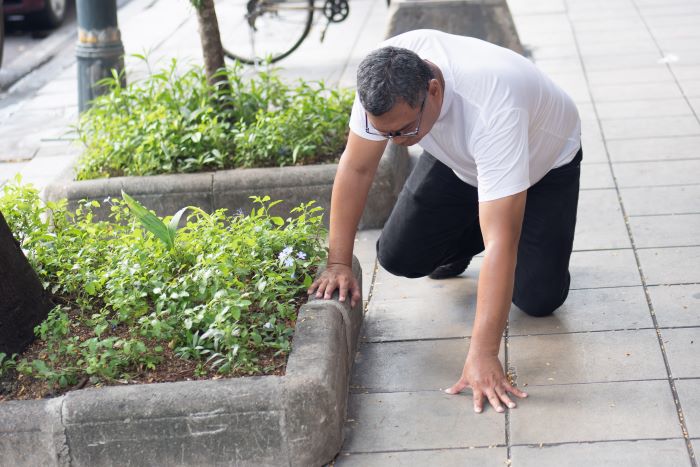Falls can have a significant impact on an individual’s quality of life, particularly for older adults, and research has shown that people with hearing loss are three times more likely to experience a fall. It’s important to understand the connection between falls and hearing health, and to take the necessary steps to prevent injuries and improve your overall well-being. In this article, we’ll discuss the importance of annual hearing screenings and how addressing hearing issues can help prevent falls and the associated pain, suffering and medical bills.

The Connection Between Hearing Loss and Falls
Hearing loss can have a profound effect on an individual’s sense of balance and spatial awareness. Our ears play a crucial role in our vestibular system, which helps us maintain our balance and spatial orientation. This system relies on a complex interplay between the inner ear, the brain and other sensory systems including vision.
When hearing loss occurs, it can disrupt the vestibular system and cause a decline in spatial awareness and balance. As a result, individuals with hearing loss may struggle to navigate their environment safely, leading to an increased risk of falls. Studies have shown that even mild hearing loss can significantly increase the likelihood of falls, making it even more important to address any hearing issues as soon as possible.
The Importance of Annual Hearing Screenings
The first step in addressing hearing loss and reducing the risk of falls is to have your hearing checked regularly. Annual hearing screenings can help detect hearing loss at an early stage, allowing you to take the appropriate measures to address the problem.
Some of the key benefits of annual hearing screenings include:
- Early Detection: Hearing loss can develop gradually over time, making it difficult to notice the changes in your hearing ability. Regular screenings can help identify any hearing issues before they worsen and become more challenging to treat.
- Preventing Further Damage: Addressing hearing loss early can help prevent further damage to your ears and auditory system. In some cases, untreated hearing loss can lead to additional health issues, such as cognitive decline, social isolation and depression.
- Appropriate Treatment: Once hearing loss is detected, you can take the necessary steps to address the issue, such as getting hearing aids. Properly fitted hearing aids can help improve your hearing ability, restore your sense of balance and reduce your risk of falling.
- Better Quality of Life: Addressing hearing issues can significantly improve your overall quality of life. Improved hearing can lead to better communication and enhanced social interactions.
Hearing Aids and Fall Prevention
Hearing aids are a common and effective treatment for hearing loss. These devices work by amplifying sounds, allowing individuals with hearing loss to hear more clearly and effectively. In addition to improving hearing ability, hearing aids can also help restore balance and spatial awareness, ultimately reducing the risk of falls.
When using hearing aids, it is essential they are correctly fitted and programmed for your specific hearing needs. This may involve working closely with an audiologist to ensure your hearing aids are optimally configured. It’s also important to remember that adjusting to hearing aids can take some time. Be patient with yourself during this process and give yourself the opportunity to adjust to the new sounds and sensations.
Conclusion
In summary, the connection between falls and hearing health cannot be overstated. By prioritizing your hearing health through annual screenings and addressing hearing loss with appropriate treatments like hearing aids, you can reduce your risk of falls and enjoy a safer, more fulfilling life. Remember that taking care of your hearing is not just about enhancing communication and social interactions; it’s also about protecting yourself from falls and their potentially devastating consequences. Don’t wait until a fall occurs to take action; invest in your hearing health today for a safer and healthier tomorrow.
Visit an Audio Help Hearing Centers office in New York City or Scarsdale, New York, or Stamford Connecticut. Give us a call at 888-832-9966 or schedule your appointment online.

